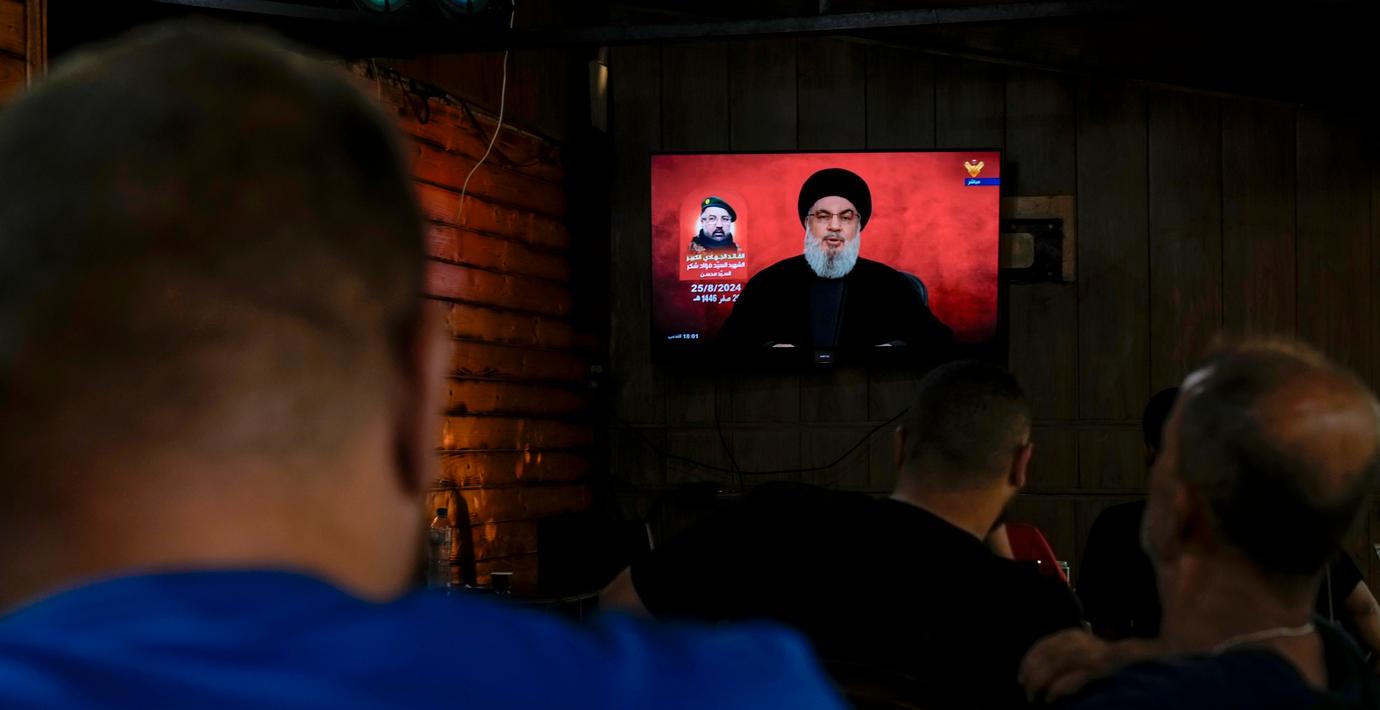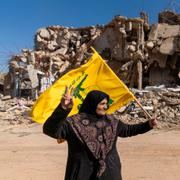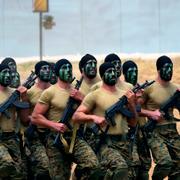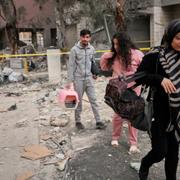
Hizbollahledaren: Detta kan ses som en krigsförklaring
Hizbollahs ”röda linjer” överträddes av de sprängningar av kommunikationsutrustning som utfördes tidigare i veckan. Det säger Hizbollahledaren Hassan Nasrallah i ett första tv-sänt tal efter attacken.
– Detta kan ses som en krigsförklaring, säger han enligt Reuters.
Hizbollah har pekat ut Israel som ansvariga. Israel kommenterar sällan eller aldrig operationer i utlandet, och har inte heller gjort det den här gången.
Omkring 3 000 personer skadades och minst 37 dödades när personsökare och komradioenheter exploderade på flera platser i Libanon tidigare i veckan.
bakgrund
Hizbollah
Wikipedia (en)
Hezbollah (; Arabic: حزب الله, romanized: Ḥizbu 'llāh, pronounced [ħizbu‿lːaːh], lit. 'Party of God') is a Lebanese Shia Islamist political party and paramilitary group, led since 1992 by its Secretary-General Hassan Nasrallah. Hezbollah's paramilitary wing is the Jihad Council, and its political wing is the Loyalty to the Resistance Bloc party in the Lebanese Parliament. Its armed strength was assessed to be equivalent to that of a medium-sized army in 2016.
Hezbollah was established by Lebanese clerics primarily to fight the 1982 Israeli invasion of Lebanon. It adopted the model set out by Ayatollah Ruhollah Khomeini after the Iranian Revolution in 1979, and the party's founders adopted the name "Hezbollah" as chosen by Khomeini. Since then, close ties have developed between Iran and Hezbollah. The organization was created with the support of 1,500 Islamic Revolutionary Guard Corps (IRGC) instructors, and aggregated a variety of Lebanese Shia groups into a unified organization to resist the then-current Israeli occupation of Southern Lebanon. During the Lebanese Civil War, Hezbollah's 1985 manifesto listed its objectives as the expulsion of "the Americans, the French and their allies definitely from Lebanon, putting an end to any colonialist entity on our land". Hezbollah also participated in the 1985–2000 South Lebanon conflict against the South Lebanon Army (SLA) and Israel Defense Forces (IDF), and fought again with the IDF in the 2006 Lebanon War. During the 1990s, Hezbollah also organized volunteers to fight for the Army of the Republic of Bosnia and Herzegovina during the Bosnian War.
Since 1990, Hezbollah has participated in Lebanese politics, in a process which is described as the Lebanonization of Hezbollah, and it later participated in the government of Lebanon and joined political alliances. After the 2006–08 Lebanese protests and clashes, a national unity government was formed in 2008, with Hezbollah and its opposition allies obtaining 11 of 30 cabinet seats, enough to give them veto power. In August 2008, Lebanon's new cabinet unanimously approved a policy statement that recognizes Hezbollah's existence as an armed organization and guarantees its right to "liberate or recover occupied lands" (such as the Shebaa Farms). Hezbollah is part of Lebanon's March 8 Alliance, in opposition to the March 14 Alliance. It maintains strong support among Lebanese Shia Muslims, while Sunnis have disagreed with its agenda. Hezbollah also has support in some Christian areas of Lebanon. Since 2012, Hezbollah involvement in the Syrian civil war has seen it join the Syrian government in its fight against the Syrian opposition, which Hezbollah has described as a Zionist plot and a "Wahhabi-Zionist conspiracy" to destroy its alliance with Bashar al-Assad against Israel. Between 2013 and 2015, the organization deployed its paramilitary in both Syria and Iraq to fight and train local militias to fight against the Islamic State. In the 2018 Lebanese general election, Hezbollah held 12 seats and its alliance won the election by gaining 70 out of 128 seats in the Parliament of Lebanon.
Hezbollah did not disarm after the Israeli withdrawal from South Lebanon, in contravention of the UN Security Council resolution 1701. From 2006, the group's military strength grew significantly, to the extent that its paramilitary wing became more powerful than the Lebanese Army. Hezbollah has been described as a "state within a state", and has grown into an organization with seats in the Lebanese government, a radio and a satellite TV station, social services and large-scale military deployment of fighters beyond Lebanon's borders. The group currently receives military training, weapons, and financial support from Iran and political support from Syria, although the sectarian nature of the Syrian war has damaged the group's legitimacy. In 2021, Nasrallah said the group had 100,000 fighters. Either the entire organization or only its military wing has been designated a terrorist organization by several countries, as well as by the European Union.
Omni är politiskt obundna och oberoende. Vi strävar efter att ge fler perspektiv på nyheterna. Har du frågor eller synpunkter kring vår rapportering? Kontakta redaktionen



